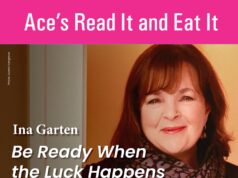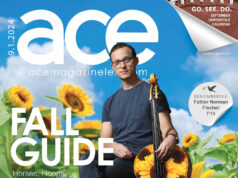Ace coverstory. Ashley Judd. March 29, 2001
BY BERT OSBORNE
To paraphrase an age-old query, how do you keep someone down on the farm once they’ve seen the bright lights of Hollywood? In the case of Kentucky native Ashley Judd the answer is simple, because it’s by her own choice that the 32-year-old actress maintains what she calls a “safe distance” from the potentially  corrupting influences of fame and fortune, opting for the relative seclusion and replenishing serenity of a small farm 20 miles outside Nashville.
corrupting influences of fame and fortune, opting for the relative seclusion and replenishing serenity of a small farm 20 miles outside Nashville.
“There are some sheep, a few llama and things like that, but it’s less what you’d call a working farm and more an idyllic sanctuary,” Judd explains during a recent interview. “Peace of mind is very important to me, because I think the private relationship you have with yourself is the spring that feeds every other factor in your life. The naturalist in me appreciates living out in the country because I believe there’s nothing in the world nature can’t soothe, but the other reason it’s so sacred to me is because it buffers me from some of the intrusive trappings of celebrity. Out here in L.A., it’s really easy to be inundated by all those sorts of career matters. I’ve just learned to be very protective of my own world.”
It’s needless to say Judd’s Southern roots run deep, when by her own admission she’s probably less inclined to sit at home “strategizing about what my next career move should be” than she is to be “worrying about how to improve my pizza crust.” Indeed, get the actress started on her joy of cooking, and she practically beams. “I’ve been branching out recently. I used to specialize in always making classic country dishes, but I’m getting braver as I get hungrier beyond my traditional Southern repertoire,” she gushes.
“My latest obsession has been trying to make a super-thin-crust pizza margherita, and I finally had to break out the Julia Child book, from which I’ve never cooked anything because it’s inherently too intimidating,” Judd confesses. “It turned out not to be that hard. I think it helped that we made a lot of bread growing up, so I was already accomplished with kneading, and accustomed to having patience with the yeast and what not. I also realized I needed a couple of other things, like the proper stone on which to cook it, so now I’m even thinking about making a little wood-burning stove outside the house. Would THAT be tasty?”
The bread-baking “we” she refers to also includes her older sister, Wynonna, and their mother, Naomi, better-known as the former country singing duo The Judds. Ashley was born in Los Angeles, but her father abandoned the family when she was 4, whereupon Mom moved the girls to a succession of rural areas throughout Kentucky and Tennessee. As the actress matter-of-factly recalls, “Over a 13-year period, I think I attended something like 10 or 12 different schools.”
It was a rather impoverished upbringing – at certain points, they were living in regions without electricity, telephones or indoor plumbing – and yet it was a “really wonderful rural lifestyle,” as Judd describes it. “We made our own soap. Sometimes, we grew our own food and churned our own butter. I mean, there was no TV, so we had to rely on ourselves and our own imaginations for entertainment. My sister discovered and started developing her talent for singing, and I became totally captivated by books and reading.”
Judd was a junior-high student of 14 when The Judds hit it big in Nashville. “My own performing ambitions were always more dramatically driven than musically motivated,” she says, but she wisely went to college before embarking on an acting career. She graduated with Phi Beta Kappa honors from the University of Kentucky, majoring in French and minoring in anthropology, art history and women’s studies – “all of which made a huge contribution to my interest in acting,” she insists.
“I learned how to read material and relate to it in ways other than just superficially,” Judd elaborates. “So much of what you do in any scholarly pursuit is the same as what you do as an actress, in terms of gathering data, thoroughly researching and investigating different scenarios, and then switching off that organizational part of yourself and getting into a much more emotional, intuitive mode, you know?”
The self-professed “country girl” relocated to L.A. in the early ’90s. Following a recurring role on the TV series Sisters and an Emmy nomination for her performance in the cable movie Norma Jean and Marilyn, she made her auspicious big-screen debut starring in the indie drama Ruby in Paradise (1993). A number of higher-profile assignments followed in Heat and A Time to Kill, but Judd continued to alternate between such mainstream fare and “smaller” (i.e., artsier) projects like Smoke or Normal Life. Among her other films: Kiss the Girls, Simon Birch, Eye of the Beholder and Where the Heart Is.
At long last, thanks to the bona fide box-office blockbuster that was Double Jeopardy (1999), Judd has finally arrived on the Hollywood scene as a viable leading lady of the first order, a proverbial “overnight success” after some 10 “long, hard” years. Playing an empowered damsel-in-distress who turns the tables on the husband who wronged her, the movie offered the actress her first opportunity to “carry” a picture.
“But those are distinctions made by other people,” she interjects. “When people start qualifying things like that, referring to Double Jeopardy as a more commercial movie or whatever, I feel as if it’s meant to somehow diminish the experiences I’ve had working on films that might not have been seen by quite so many people. For my part, everything I do means something important to me personally. I think I’ve been fortunate to strike a nice balance between doing the kind of work I want to do, while also acquiring a certain savvy about the whole business side of things.”
Judd’s latest film is the egregiously retitled Someone Like You (opening March 30), based on Laura Zigman’s best-selling novel Animal Husbandry. With a breezy charm that ought to have Meg Ryan looking over her shoulder, she plays a spunky TV-talk-show talent scout torn between two lovers (Greg Kinnear and Hugh Jackman) by day, and a would-be sex therapist by night who publishes a pseudonymous theory equating the emotional behavior of the modern man to the mating habits of the common bovine. Under the direction of Tony Goldwyn (A Walk on the Moon), the supporting cast also features Marisa Tomei and Ellen Barkin.
(An avid Wildcats fan, Judd called on the UK cheerleading squad for assistance with one scene, in which she’s required to perform an old college cheer: “Those girls choreographed that for me, and it was a lot of fun. I hope they’re properly acknowledged. They’re supposed to get a special thanks in the end credits.”)
Whether by coincidence or design, the movie marks the star’s first foray into the realm of romantic comedy. “It was probably a confluence of the two, because when I was younger, I thought my greatest aspiration as an actress was to be serious and intense, and a lot of my earlier career was a function of that belief,” Judd replies.
“I was ready to try other things, and I thought this script was very clever in addition to being really sweet. I mean, the whole concept of romantic comedy is that there are these two people who are fated to be together, but it needs to be challenging and rewarding in ways which go beyond that inevitable conclusion, you know?”
Judd admits she’s no novice when it comes to escaping inevitable conclusions. To be sure, she’s as pretty as any other movie star, and she’s considerably more talented than many – but it’s her obvious intelligence that serves her so well (and catches the most people offguard).
The actress smiles and observes, “Sometimes people are surprised to find I have an urban, sophisticated side to me, as if I’m well-rounded in ways they didn’t expect, either as an actress or as a Southerner or both, I’m not sure which. I can walk into someone’s office and after five minutes they’ll tell me, ‘You’re so CULTIVATED.’ I feel like they’re just waiting for me to say something like, ‘Aw, shucks.'”








